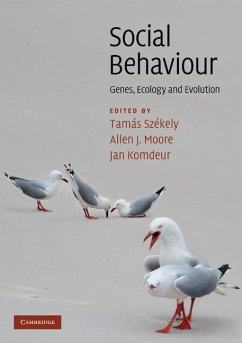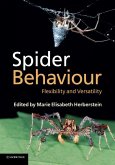Social Behaviour
Herausgeber: Komdeur, Jan; Székely, Tamás; Moore, Allen
Social Behaviour
Herausgeber: Komdeur, Jan; Székely, Tamás; Moore, Allen
- Broschiertes Buch
- Merkliste
- Auf die Merkliste
- Bewerten Bewerten
- Teilen
- Produkt teilen
- Produkterinnerung
- Produkterinnerung
A comprehensive analysis of the genetic, ecological and phylogenetic aspects of social behaviour, by experts in the field.
Andere Kunden interessierten sich auch für
![Spider Behaviour Spider Behaviour]() Spider Behaviour108,99 €
Spider Behaviour108,99 €![Cattle Behaviour and Welfare Cattle Behaviour and Welfare]() Clive PhillipsCattle Behaviour and Welfare140,99 €
Clive PhillipsCattle Behaviour and Welfare140,99 €![Tinbergen's Legacy Tinbergen's Legacy]() Simon VerhulstTinbergen's Legacy65,99 €
Simon VerhulstTinbergen's Legacy65,99 €![Avian Cognition Avian Cognition]() Avian Cognition50,99 €
Avian Cognition50,99 €![American Cattle Doctor American Cattle Doctor]() G. H. DaddAmerican Cattle Doctor28,99 €
G. H. DaddAmerican Cattle Doctor28,99 €![The Happy Boston Terrier: Raise Your Puppy to a Happy, Well-Mannered Dog The Happy Boston Terrier: Raise Your Puppy to a Happy, Well-Mannered Dog]() Asia MooreThe Happy Boston Terrier: Raise Your Puppy to a Happy, Well-Mannered Dog17,99 €
Asia MooreThe Happy Boston Terrier: Raise Your Puppy to a Happy, Well-Mannered Dog17,99 €![National Geographic Complete Guide to Pet Health, Behavior, and Happiness: The Veterinarian's Approach to At-Home Animal Care National Geographic Complete Guide to Pet Health, Behavior, and Happiness: The Veterinarian's Approach to At-Home Animal Care]() Gary WeitzmanNational Geographic Complete Guide to Pet Health, Behavior, and Happiness: The Veterinarian's Approach to At-Home Animal Care22,99 €
Gary WeitzmanNational Geographic Complete Guide to Pet Health, Behavior, and Happiness: The Veterinarian's Approach to At-Home Animal Care22,99 €-
-
-
A comprehensive analysis of the genetic, ecological and phylogenetic aspects of social behaviour, by experts in the field.
Hinweis: Dieser Artikel kann nur an eine deutsche Lieferadresse ausgeliefert werden.
Hinweis: Dieser Artikel kann nur an eine deutsche Lieferadresse ausgeliefert werden.
Produktdetails
- Produktdetails
- Verlag: Cambridge University Press
- Seitenzahl: 576
- Erscheinungstermin: 18. November 2010
- Englisch
- Abmessung: 246mm x 189mm x 31mm
- Gewicht: 1099g
- ISBN-13: 9780521709620
- ISBN-10: 0521709628
- Artikelnr.: 29012595
- Herstellerkennzeichnung
- Books on Demand GmbH
- In de Tarpen 42
- 22848 Norderstedt
- info@bod.de
- 040 53433511
- Verlag: Cambridge University Press
- Seitenzahl: 576
- Erscheinungstermin: 18. November 2010
- Englisch
- Abmessung: 246mm x 189mm x 31mm
- Gewicht: 1099g
- ISBN-13: 9780521709620
- ISBN-10: 0521709628
- Artikelnr.: 29012595
- Herstellerkennzeichnung
- Books on Demand GmbH
- In de Tarpen 42
- 22848 Norderstedt
- info@bod.de
- 040 53433511
Introduction Tamás Székely, Allen J. Moore and Jan Komdeur; Part I.
Foundations: 1. Nature-nurture interactions Marla B. Sokolowski and Joel D.
Levine; 2. The quantitative genetics of social behaviour Bronwyn H.
Bleakley, Jason B. Wolf and Allen J. Moore; 3. Social behaviour and
bird-song from a neural and endocrine perspective Elizabeth Adkins-Regan,
Timothy J. DeVoogd and Jordan M. Moore; 4. Evolutionary game theory John M.
McNamara and Franz J. Weissing; 5. Recent advances in comparative methods
Robert P. Freckleton and Mark Pagel; 6. Social evolution theory: a review
of methods and approaches Tom Wenseleers, Andy Gardner and Kevin R. Foster;
Part II. Themes: 7. Aggression: towards an integration of gene, brain and
behaviour Robert Huber and Edward A. Kravitz; 8. Social influences on
communication signals: from honesty to exploitation Mark E. Hauber and
Marlene Zuk; 9. Important topics in group living Jens Krause and Graeme
Ruxton; 10. Sexual behaviour: conflict, cooperation and co-evolution
Tomasso Pizzari and Russell Bonduriansky; 11. Pair bonds and parental
behaviour Lisa McGraw, Tamás Székely and Larry J. Young; 12. Adaptations
and constraints in the evolution of delayed dispersal: implications for
cooperation Jan Komdeur and Jan Ekman; 13. Social behaviour in
microorganisms Kevin R. Foster; 14. Social environments, social tactics and
their fitness consequences in complex mammalian societies Marion L. East
and Heribert Hofer; 15. Social behaviour in humans Ruth Mace; Part III.
Implications: 16. Personality and individual social specialisation Denis
Réale and Niels J. Dingemanse; 17. Molecular and genetic influences on the
neural substrate of social cognition in humans Louise Gallagher and David
Skuse; 18. Population density, social behaviour and sex allocation Suzanne
H. Alonzo and Ben C. Sheldon; 19. Social behaviour and speciation Gerald S.
Wilkinson and Leanna M. Birge; 20. Social behaviour in conservation Daniel
T. Blumstein; 21. Prospects for research in social behaviour: systems
biology meets behaviour Allen J. Moore, Tamás Székely and Jan Komdeur; Part
IV. Profiles: 22. Undiminished passion Tim Birkhead; 23. Social evolution,
sexual intrigue and serendipity Andrew Cockburn; 24. Mating systems:
integrating sexual conflict and ecology Nicholas B. Davies; 25. In love
with Ropalidia marginata - for 34 years, and still going strong Raghavendra
Gadagkar; 26. The Huddler's Dilemma: a cold shoulder or a warm inner glow
David Haig; 27. Multi-component signals in ant communication Bert
Hölldobler; 28. What's wrong with this picture? Sarah B. Hrdy; 29. From
behavioural observations, to genes, to evolution Laurent Keller; 30.
Reputation can make the world go round - or why we are sometimes social
Manfred Milinski; 31. A haphazard career Ronald Noë; 32. In celebration of
questions, past, present and future Geoff A. Parker; 33. Mating systems and
genetic variation Marion Petrie; 34. Selections from a life in social
selection David C. Queller; 35. The de novo evolution of cooperation: an
unlikely event Paul B. Rainey; 36. Evolutionary genetics and social
behaviour Mike Ritchie; 37. Genes and social behaviour: from gene to genome
to 1000 animal genomes Gene E. Robinson; 38. Behavioural ecology, why do I
love thee? Let me count the ways Paul W. Sherman; 39. Anonymous (and other)
social experience and the evolution of cooperation by reciprocity Michael
Taborsky; 40. Social theory based on natural selection Robert Trivers; 41.
Look to the ants Edward O. Wilson; 42. The handicap principle and social
behaviour Amotz Zahavi .
Foundations: 1. Nature-nurture interactions Marla B. Sokolowski and Joel D.
Levine; 2. The quantitative genetics of social behaviour Bronwyn H.
Bleakley, Jason B. Wolf and Allen J. Moore; 3. Social behaviour and
bird-song from a neural and endocrine perspective Elizabeth Adkins-Regan,
Timothy J. DeVoogd and Jordan M. Moore; 4. Evolutionary game theory John M.
McNamara and Franz J. Weissing; 5. Recent advances in comparative methods
Robert P. Freckleton and Mark Pagel; 6. Social evolution theory: a review
of methods and approaches Tom Wenseleers, Andy Gardner and Kevin R. Foster;
Part II. Themes: 7. Aggression: towards an integration of gene, brain and
behaviour Robert Huber and Edward A. Kravitz; 8. Social influences on
communication signals: from honesty to exploitation Mark E. Hauber and
Marlene Zuk; 9. Important topics in group living Jens Krause and Graeme
Ruxton; 10. Sexual behaviour: conflict, cooperation and co-evolution
Tomasso Pizzari and Russell Bonduriansky; 11. Pair bonds and parental
behaviour Lisa McGraw, Tamás Székely and Larry J. Young; 12. Adaptations
and constraints in the evolution of delayed dispersal: implications for
cooperation Jan Komdeur and Jan Ekman; 13. Social behaviour in
microorganisms Kevin R. Foster; 14. Social environments, social tactics and
their fitness consequences in complex mammalian societies Marion L. East
and Heribert Hofer; 15. Social behaviour in humans Ruth Mace; Part III.
Implications: 16. Personality and individual social specialisation Denis
Réale and Niels J. Dingemanse; 17. Molecular and genetic influences on the
neural substrate of social cognition in humans Louise Gallagher and David
Skuse; 18. Population density, social behaviour and sex allocation Suzanne
H. Alonzo and Ben C. Sheldon; 19. Social behaviour and speciation Gerald S.
Wilkinson and Leanna M. Birge; 20. Social behaviour in conservation Daniel
T. Blumstein; 21. Prospects for research in social behaviour: systems
biology meets behaviour Allen J. Moore, Tamás Székely and Jan Komdeur; Part
IV. Profiles: 22. Undiminished passion Tim Birkhead; 23. Social evolution,
sexual intrigue and serendipity Andrew Cockburn; 24. Mating systems:
integrating sexual conflict and ecology Nicholas B. Davies; 25. In love
with Ropalidia marginata - for 34 years, and still going strong Raghavendra
Gadagkar; 26. The Huddler's Dilemma: a cold shoulder or a warm inner glow
David Haig; 27. Multi-component signals in ant communication Bert
Hölldobler; 28. What's wrong with this picture? Sarah B. Hrdy; 29. From
behavioural observations, to genes, to evolution Laurent Keller; 30.
Reputation can make the world go round - or why we are sometimes social
Manfred Milinski; 31. A haphazard career Ronald Noë; 32. In celebration of
questions, past, present and future Geoff A. Parker; 33. Mating systems and
genetic variation Marion Petrie; 34. Selections from a life in social
selection David C. Queller; 35. The de novo evolution of cooperation: an
unlikely event Paul B. Rainey; 36. Evolutionary genetics and social
behaviour Mike Ritchie; 37. Genes and social behaviour: from gene to genome
to 1000 animal genomes Gene E. Robinson; 38. Behavioural ecology, why do I
love thee? Let me count the ways Paul W. Sherman; 39. Anonymous (and other)
social experience and the evolution of cooperation by reciprocity Michael
Taborsky; 40. Social theory based on natural selection Robert Trivers; 41.
Look to the ants Edward O. Wilson; 42. The handicap principle and social
behaviour Amotz Zahavi .
Introduction Tamás Székely, Allen J. Moore and Jan Komdeur; Part I.
Foundations: 1. Nature-nurture interactions Marla B. Sokolowski and Joel D.
Levine; 2. The quantitative genetics of social behaviour Bronwyn H.
Bleakley, Jason B. Wolf and Allen J. Moore; 3. Social behaviour and
bird-song from a neural and endocrine perspective Elizabeth Adkins-Regan,
Timothy J. DeVoogd and Jordan M. Moore; 4. Evolutionary game theory John M.
McNamara and Franz J. Weissing; 5. Recent advances in comparative methods
Robert P. Freckleton and Mark Pagel; 6. Social evolution theory: a review
of methods and approaches Tom Wenseleers, Andy Gardner and Kevin R. Foster;
Part II. Themes: 7. Aggression: towards an integration of gene, brain and
behaviour Robert Huber and Edward A. Kravitz; 8. Social influences on
communication signals: from honesty to exploitation Mark E. Hauber and
Marlene Zuk; 9. Important topics in group living Jens Krause and Graeme
Ruxton; 10. Sexual behaviour: conflict, cooperation and co-evolution
Tomasso Pizzari and Russell Bonduriansky; 11. Pair bonds and parental
behaviour Lisa McGraw, Tamás Székely and Larry J. Young; 12. Adaptations
and constraints in the evolution of delayed dispersal: implications for
cooperation Jan Komdeur and Jan Ekman; 13. Social behaviour in
microorganisms Kevin R. Foster; 14. Social environments, social tactics and
their fitness consequences in complex mammalian societies Marion L. East
and Heribert Hofer; 15. Social behaviour in humans Ruth Mace; Part III.
Implications: 16. Personality and individual social specialisation Denis
Réale and Niels J. Dingemanse; 17. Molecular and genetic influences on the
neural substrate of social cognition in humans Louise Gallagher and David
Skuse; 18. Population density, social behaviour and sex allocation Suzanne
H. Alonzo and Ben C. Sheldon; 19. Social behaviour and speciation Gerald S.
Wilkinson and Leanna M. Birge; 20. Social behaviour in conservation Daniel
T. Blumstein; 21. Prospects for research in social behaviour: systems
biology meets behaviour Allen J. Moore, Tamás Székely and Jan Komdeur; Part
IV. Profiles: 22. Undiminished passion Tim Birkhead; 23. Social evolution,
sexual intrigue and serendipity Andrew Cockburn; 24. Mating systems:
integrating sexual conflict and ecology Nicholas B. Davies; 25. In love
with Ropalidia marginata - for 34 years, and still going strong Raghavendra
Gadagkar; 26. The Huddler's Dilemma: a cold shoulder or a warm inner glow
David Haig; 27. Multi-component signals in ant communication Bert
Hölldobler; 28. What's wrong with this picture? Sarah B. Hrdy; 29. From
behavioural observations, to genes, to evolution Laurent Keller; 30.
Reputation can make the world go round - or why we are sometimes social
Manfred Milinski; 31. A haphazard career Ronald Noë; 32. In celebration of
questions, past, present and future Geoff A. Parker; 33. Mating systems and
genetic variation Marion Petrie; 34. Selections from a life in social
selection David C. Queller; 35. The de novo evolution of cooperation: an
unlikely event Paul B. Rainey; 36. Evolutionary genetics and social
behaviour Mike Ritchie; 37. Genes and social behaviour: from gene to genome
to 1000 animal genomes Gene E. Robinson; 38. Behavioural ecology, why do I
love thee? Let me count the ways Paul W. Sherman; 39. Anonymous (and other)
social experience and the evolution of cooperation by reciprocity Michael
Taborsky; 40. Social theory based on natural selection Robert Trivers; 41.
Look to the ants Edward O. Wilson; 42. The handicap principle and social
behaviour Amotz Zahavi .
Foundations: 1. Nature-nurture interactions Marla B. Sokolowski and Joel D.
Levine; 2. The quantitative genetics of social behaviour Bronwyn H.
Bleakley, Jason B. Wolf and Allen J. Moore; 3. Social behaviour and
bird-song from a neural and endocrine perspective Elizabeth Adkins-Regan,
Timothy J. DeVoogd and Jordan M. Moore; 4. Evolutionary game theory John M.
McNamara and Franz J. Weissing; 5. Recent advances in comparative methods
Robert P. Freckleton and Mark Pagel; 6. Social evolution theory: a review
of methods and approaches Tom Wenseleers, Andy Gardner and Kevin R. Foster;
Part II. Themes: 7. Aggression: towards an integration of gene, brain and
behaviour Robert Huber and Edward A. Kravitz; 8. Social influences on
communication signals: from honesty to exploitation Mark E. Hauber and
Marlene Zuk; 9. Important topics in group living Jens Krause and Graeme
Ruxton; 10. Sexual behaviour: conflict, cooperation and co-evolution
Tomasso Pizzari and Russell Bonduriansky; 11. Pair bonds and parental
behaviour Lisa McGraw, Tamás Székely and Larry J. Young; 12. Adaptations
and constraints in the evolution of delayed dispersal: implications for
cooperation Jan Komdeur and Jan Ekman; 13. Social behaviour in
microorganisms Kevin R. Foster; 14. Social environments, social tactics and
their fitness consequences in complex mammalian societies Marion L. East
and Heribert Hofer; 15. Social behaviour in humans Ruth Mace; Part III.
Implications: 16. Personality and individual social specialisation Denis
Réale and Niels J. Dingemanse; 17. Molecular and genetic influences on the
neural substrate of social cognition in humans Louise Gallagher and David
Skuse; 18. Population density, social behaviour and sex allocation Suzanne
H. Alonzo and Ben C. Sheldon; 19. Social behaviour and speciation Gerald S.
Wilkinson and Leanna M. Birge; 20. Social behaviour in conservation Daniel
T. Blumstein; 21. Prospects for research in social behaviour: systems
biology meets behaviour Allen J. Moore, Tamás Székely and Jan Komdeur; Part
IV. Profiles: 22. Undiminished passion Tim Birkhead; 23. Social evolution,
sexual intrigue and serendipity Andrew Cockburn; 24. Mating systems:
integrating sexual conflict and ecology Nicholas B. Davies; 25. In love
with Ropalidia marginata - for 34 years, and still going strong Raghavendra
Gadagkar; 26. The Huddler's Dilemma: a cold shoulder or a warm inner glow
David Haig; 27. Multi-component signals in ant communication Bert
Hölldobler; 28. What's wrong with this picture? Sarah B. Hrdy; 29. From
behavioural observations, to genes, to evolution Laurent Keller; 30.
Reputation can make the world go round - or why we are sometimes social
Manfred Milinski; 31. A haphazard career Ronald Noë; 32. In celebration of
questions, past, present and future Geoff A. Parker; 33. Mating systems and
genetic variation Marion Petrie; 34. Selections from a life in social
selection David C. Queller; 35. The de novo evolution of cooperation: an
unlikely event Paul B. Rainey; 36. Evolutionary genetics and social
behaviour Mike Ritchie; 37. Genes and social behaviour: from gene to genome
to 1000 animal genomes Gene E. Robinson; 38. Behavioural ecology, why do I
love thee? Let me count the ways Paul W. Sherman; 39. Anonymous (and other)
social experience and the evolution of cooperation by reciprocity Michael
Taborsky; 40. Social theory based on natural selection Robert Trivers; 41.
Look to the ants Edward O. Wilson; 42. The handicap principle and social
behaviour Amotz Zahavi .








